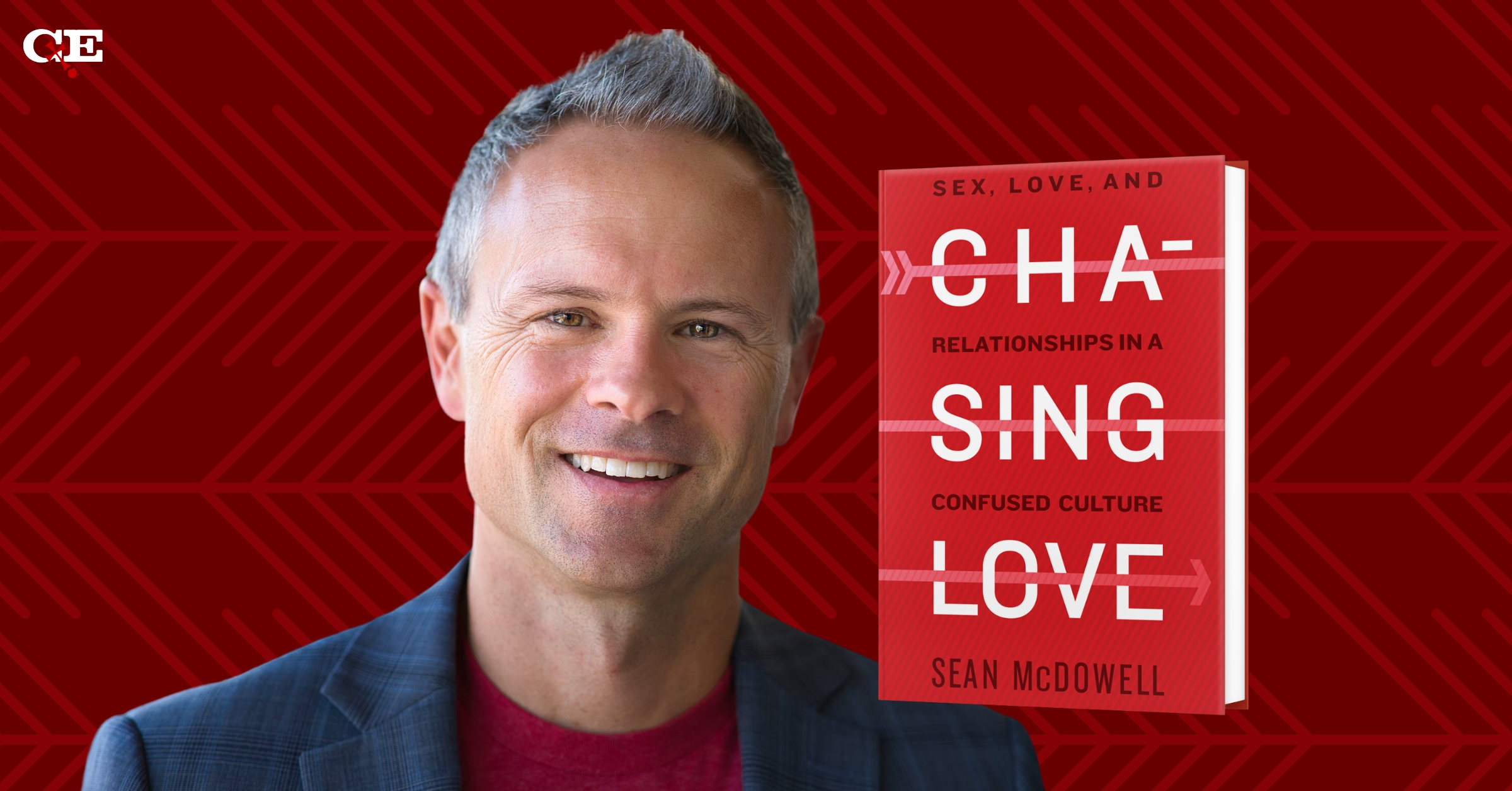Over the last several years, I’ve spoken on the subject of apologetics to many groups of parents at churches and conferences. Although none of my talks deal with the topic of sexuality, I can hardly think of a time when I wasn’t asked a question about it either in the Q & A or in private conversation afterward with an individual parent. In particular, parents always want to know what they should say to their kids about homosexuality and transgender questions. These are undoubtedly the most top of mind questions parents have today.
Not the Sex Question Again!
While I can appreciate that these specific questions are front and center in culture, I always feel a bit disappointed when I get them. Frankly, I feel like we’ve really missed the boat if this is the “big” question people have after a much broader talk on apologetics. I say that for two reasons.
First, kids won’t care what the Bible says about homosexuality and transgender questions if they don’t view the Bible as authoritative. That’s why my answer to parents always begins the same: “Can you tell me first what your child believes about the Bible? Does he/she believe it’s the authoritative Word of God?” I’d say that out of 10 people who ask the question, a solid 7 of them will say, “I’m not sure.” It’s deeply problematic that many Christian parents have come to believe that our biggest conversation challenge in today’s culture is how to answer controversial questions about sexuality . . . even though they often aren’t sure what their kids believe about the Bible itself! If we spent as much time teaching kids why there’s good reason to believe the Bible is true as we did addressing subjects that today’s culture happens to bring to the forefront, we would be in a much more natural position to address difficult topics.
Second, there is so much more than homosexuality and transgender questions that our kids need to understand about a biblical view of sexuality. That’s why I’m thrilled about Sean McDowell’s new book, Chasing Love: Sex, Love, and Relationships in a Confused Culture. It’s a book for teens that provides a comprehensive biblical look at sex, love, and relationships–the best resource I’ve seen on the subject!
Sean took the time to answer several questions I sent him on how to talk with teens about sex and love. Enjoy the following interview, and if you have kids in this age range, you must get this book.
An Interview with Sean McDowell
Natasha: Sean, when Christian parents think about conversations they need to have with their kids about sex, they’re often thinking about two basic things: 1) How do I teach my kids (and convince them!) that it’s biblically right and best to wait for marriage? and 2) How do I talk about the hot cultural topics of homosexuality and gender identity from a biblical perspective? But, as your book shows, these questions only scratch the surface of a whole framework kids need to have for thinking about love and sex from a biblical worldview. Can you explain why this approach is so important, and give some examples of subjects you cover outside of what parents typically think about?
Sean: After working with thousands of young people for a couple decades, I am convinced that the vast majority of Christian kids are far more secular in their thinking than we realize. Studies by the Barna Group support this observation. Thus, it’s not enough to simply teach biblical principles to our kids–we have to first deconstruct their secular ideas about love, freedom, and happiness, and then biblical teaching will make sense.
I was speaking at a conference in early 2020 and a teenager came up to me and said, “Thanks for your talk on pornography. I have been told my whole life why porn is wrong, but I never understood why.” Being told what to believe is not enough today. Kids need to know why the Bible gives the teaching that it gives. In my experience, when kids get the “why” behind the “what,” they are empowered to live out a Christian sexual ethic.
Once kids understand the positive reasons for the biblical teaching on sex, love and relationships, then they are in a much better position to discuss some of the “thornier” topics today including pornography, sex abuse, LGBTQ issues, and so on. That’s why I arranged the book in three main sections: (1) Clearing away faulty ideas from our culture, (2) explaining the biblical view of sex, love, and marriage, and then (3) “hot topics.”
Natasha: Christians are often known for what we’re “against” when it comes to topics of love and sex, and that perception easily gets passed on to teens. What are some things Christian parents do that inadvertently solidifies this view in their kids’ minds?
Sean: One trap Christian parents can fall into is being entirely critical of how non-Christians tend to approach sex and relationships. While there is undoubtedly a time and place to criticize how our world approaches sex, I try to help students find redeeming truths underneath the surface. Let’s lead with common ground, and then we can get to our differences.
For instance, consider the topic of cohabitation. As I document in Chasing Love, the research shows that living together before marriage puts a future marriage at a serious disadvantage. Students need to know why cohabitation is a bad idea. But we also need them to realize that many people live together first because they actually think it will help them in their future marriage. Many have seen their parents go through a divorce and they don’t want to make the same mistake. So, underneath the bad idea of living together is often a good desire to have healthy relationships.
Rather than leading with criticism, let’s lead with what we have in common with others. In this case, it’s the desire for lasting relationships. Then we can get to our differences. In my view, this approach is biblical, charitable, and often more effective (see Proverbs 24:3).
Natasha: What are some of the big things you want teens to understand Christians are “for” in the areas of love and sex?
Sean: One of the main takeaways I hope students get is that the commands of Jesus are for our good. In one of the early chapters, I ask students to imagine what the world would be like if everyone followed the sexual ethic of Jesus. There would be no sexually transmitted diseases, crude sexual humor, sex abuse, pornography, abortion, or deadbeat dads. My goal is for students to realize that the teachings of Jesus are for individual flourishing and for societal good. God’s commands are not to harm us, as our society proclaims, but are actually for our good.
In sum, God is for marriage. God is for love. God is for commitment. God is for meaningful relationships. God is for sex. But He has given us guidelines about how to experience these in a way that shows love to Him and to others.
Natasha: You speak to and teach a lot of kids in the age range this book is written for. In your experience, what do they most misunderstand about what the Bible teaches on these subjects?
Sean: In my experience, students are deeply confused about the nature of freedom. Many young Christians think that freedom is doing whatever they want without restraint. But this freedom from is only half the story. There is also freedom for. Think about it this way: Just like a car that has been designed by its creator to operate in a certain fashion, and is only “free” when used accordingly, humans have been created for a greater purpose and experience freedom when they discover and live that purpose. The free person not only has the capacity of choice (freedom from) but orients his or her life to God’s design (freedom for).
So, what have we been made for? Scripture says we are made to love God and love other people. In other words, we are only free when we are in healthy, intimate relationships with others. Here is how I put it in Chasing Love: “According to the Christian worldview, true freedom is not a matter of doing what you want without restraint, but cultivating the right wants and living in obedience to God’s will. In other words, freedom results when our wants align with the will of God.”
Students tend to believe that God’s commands limit their freedom. What we must help them see is that God’s commands actually set them free. That’s why David rejoiced in the law of the Lord (Psalm 119). And that’s why Moses said that God’s commands were for the good of the Israelites (Deuteronomy 10:13).
Natasha: Let’s be honest—a lot of parents are pretty uncomfortable talking about sex-related subjects with their kids. For some parents, it may even be hard to hand their kids a book like Chasing Love! Can you share some ideas for how to break the ice and not feel completely awkward handing your teen a book on these subjects? And what might a parent say to get their child interested in reading this if they don’t necessarily want to read another “Christian” book from mom and dad?
Sean: I told my 12-year-old daughter that if she read the book and was willing to simply talk with me about it, I would buy her some new shoes. This strategy may not work with all kids, but it did with her. She agreed to read it entirely and then go to the local coffee shop with me and simply discuss it (no lectures!). I asked her what she learned, what stories stood out to her, and if there was anything she disagreed with. And then we went together to buy the shoes (for the record, she talked me into buying two pairs at the outlet since they’re the price of one pair elsewhere!).
If you haven’t talked with your kids about sex, I would encourage you to take your son or daughter out for a meal or coffee and just share your story. Don’t lecture your son or daughter, but just share your experience with relationships and some lessons you’ve learned along the way. And then you can give the book as a follow up that expresses your heart for your son or daughter.
Natasha: If you could give parents one piece of advice on using your book effectively in their kids’ lives, what would it be?
Sean: Find a way to motivate your son or daughter to read it. And consider reading it alongside them. Students will benefit from reading it alone, but they will benefit immensely from discussing it with you. Studies show that worldviews are best passed through relationships. Simply discussing these issues with your kids, even if you don’t have all the answers, is a “win” for them. I realize these conversations can be awkward, but if we don’t talk with our kids, they will almost assuredly take their cues about sex, love, and relationships from the wider culture.
Recommended resources related to the topic:
Sex and Your Commanding Officer (DVD) (Mp4 Download) by Dr. Frank Turek
4 P’s & 4 Q’s: Quick Case FOR Natural Marriage & AGAINST Same-Sex Marriage (DVD) by Dr. Frank Turek
Correct not Politically Correct: About Same-Sex Marriage and Transgenderism by Frank Turek (Book, MP4)
Jesus vs. The Culture by Dr. Frank Turek DVD, Mp4 Download, and Mp3
Natasha Crain is a blogger, author, and national speaker who is passionate about equipping Christian parents to raise their kids with an understanding of how to make a case for and defend their faith in an increasingly secular world. She is the author of two apologetics books for parents: Talking with Your Kids about God (2017) and Keeping Your Kids on God’s Side (2016). Natasha has an MBA in marketing and statistics from UCLA and a certificate in Christian apologetics from Biola University. A former marketing executive and adjunct professor, she lives in Southern California with her husband and three children.
Original Blog Source: https://bit.ly/45rXVDj





